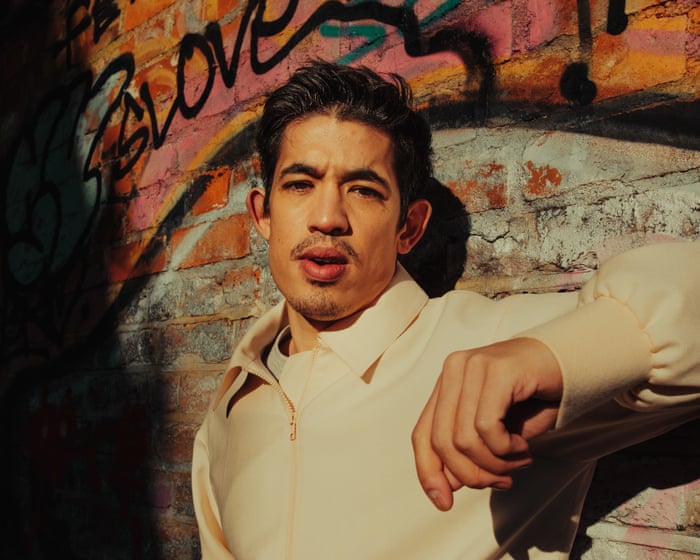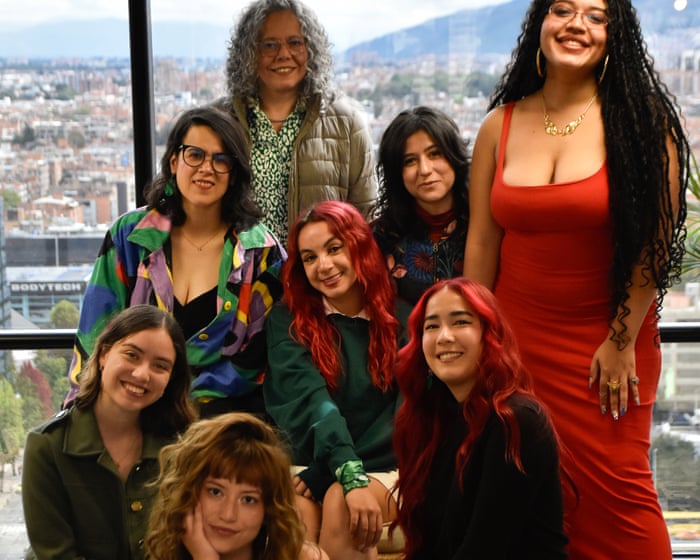Christopher Chung isn’t surprised anymore when strangers come up and insult him to his face. “It happened just yesterday,” he says. “A guy walked over and said, ‘Are you from Slow Horses? You’re terrible.'” Other times, it’s something like, “You’re a jerk.”
But the 37-year-old adds that these insults are usually “said with love and affection.” He explains, “As an actor, I want to have some kind of impact, so it’s actually… really nice.” He pauses, searching for the right word, then smiles and breaks into laughter.
No matter what fans of the hit spy series Slow Horses think of his character, for Chung, playing the talented but abrasive hacker Roddy Ho is a dream role. “The best part is not having to worry about the other characters’ feelings. You can be as arrogant and obnoxious as you want.” He sees Roddy as “a bit on the spectrum” and “misunderstood”—never “vindictive” or “mean,” just “self-centered” and unfiltered. “Sometimes, the things he says out loud are like my own inner thoughts. So it’s a really fun character to play: I get to say exactly what I’m thinking.”
We meet in London’s Soho, not far from Slough House, the shabby east London office for disgraced MI5 spies where Roddy spends most of his time glued to a computer. But in the new season, a string of strange events unfolds in the city, and the hacker takes on a more central role. He lands a glamorous girlfriend and, in one thrilling episode where he wields a sword, appears shirtless, with a colleague noting he’s “ripped.”
Sitting across from Chung, I mention how unusual it is for a geeky character to be portrayed as physically attractive—in the books, the hacker’s standout feature is his thick black glasses. “He’s just me,” Chung says in a Roddy-like drawl that makes us both laugh.
It becomes clear, though, that I’ve hit a sensitive topic. He tells me that after moving to the UK at age 24 in 2012, he faced a lot of “unconscious bias” as an actor of East Asian heritage: “It’s always one step forward, two steps back.” He often auditioned for roles he didn’t want—”stereotypes like the takeout worker or the Asian nurse, side characters with no real agency”—and other opportunities were scarce.
“I always thought my career would max out at being the lead’s best friend. I never imagined I’d get to be the lead myself.”
To afford the freedom to be pickier with his acting roles, he started working as a personal trainer. “Without that, my career might look very different today.” He still trains clients: “I had one this morning. I love it because it shifts the focus outward—for that hour, it’s about them, not me. That’s really healthy.”
When the role of Roddy came along, Chung “was really worried about my physique because I was pretty muscular at the time.” For his audition, he tried to “cover up” with a hoodie. After landing the part, he found his costume was too small and “started to panic, thinking they wanted me to be this stereotypical geeky Asian kid.” He wondered how fast he could lose muscle. But at his first rehearsal, those fears vanished. “They said, ‘No, no—we’re going to incorporate all of that into the character.’ Hearing that was so freeing.” He realized he could play Roddy in a way that challenged even his own assumptions about how a nerdy East Asian man should appear on screen: “That was the most beautiful gift this job gave me.”
Acting alongsidWorking alongside stars like Gary Oldman, who plays Roddy’s grimy and unpredictable boss Jackson Lamb, has pushed Christopher Chung to bring his best to every scene. “You’re trying to meet them at their level so they don’t have a weak performance to react to,” he says.
Off-screen, the cast of the show feel like a “dysfunctional family,” with Oldman as a “very supportive” father figure. There’s plenty of banter and camaraderie among them, Chung notes. When Oldman found out Chung could sing, the two recorded a version of “Let It Be” together just for fun.
The role has been a game-changer for Chung. Since then, he’s been cast as a hot-headed soldier in Doctor Who, a villain’s sidekick in Steve McQueen’s film Blitz, and has just finished filming the Australian Netflix period drama My Brilliant Career, where he plays the romantic lead, the handsome and wealthy Harry Beecham.
“I always thought my career would max out at being the lead’s best friend,” he admits. “I never imagined I’d get to play the lead myself.” Previous auditions for leading roles hadn’t worked out, and for a long time, he couldn’t picture himself in those parts. “Growing up, I was never the most desirable kid,” he reflects.
Chung was born to an Irish mother and a Malaysian Chinese father—they met at a party in London in the 1970s—and he often visits his mother’s hometown of Limerick. He grew up in Mornington, a suburb of Melbourne, where he was one of only three or four Chinese students in a school of 2,500. “I remember kids yelling at me on the field: ‘Jackie Chan, do some kung fu!’ all the time,” he recalls. His acting idol was Heath Ledger; he wasn’t into martial arts and didn’t see an East Asian actor whose career path he wanted to follow.
Despite this, he loved performing from a young age and knew no other career appealed as much. He took acting courses in New York and Philadelphia before moving to London. Within six months, he landed the role of Archie Wong in the BBC drama Waterloo Road—a student who secretly helps his (white) language teacher learn Mandarin. He went on to theater roles, including playing the jock Kurt in the musical Heathers and Paris in Romeo and Juliet at the Globe.
Then the Covid-19 pandemic hit, closing theaters. During lockdown, Chung wondered if he should take a break from acting: “If you weren’t an established actor at that point, what hope did you have?”
Just before the second lockdown, he was cast as Roddy. When his agent told him the news, “I broke down on the ground and cried,” Chung says. “Here I was, with an opportunity to have the career I’d always dreamed of.”
Reflecting on the twists and turns of his career, I mention it’s hard to picture Roddy on stage dancing in a musical. At first, he jokes, “I like to show range.” But after thinking it over, he explains that in his experience, a…Actors from minority ethnic backgrounds “can’t just be good at one thing. You have to be good at everything if you want to work.”
Before landing his role in Slow Horses, Chung says he often felt typecast by directors. “They would say things like, ‘This is the Asian part,'” he explains. While working on Waterloo Road, an executive producer once suggested a storyline where his character Archie would “go to China on a boat.” Internally, Chung thought, “What the hell?” but replied, “Okay.” At the time, he didn’t have the confidence to push back and ask what that even meant. He felt singled out and that his presence on set was just about filling a quota.
He credits his wife, Scottish actor Frances Mayli McCann, for helping him persevere. “She told me to keep going,” he says. Earlier this year, he was nominated for Best Supporting Actor at the BAFTA TV Awards, becoming only the third East Asian male actor ever to receive a nomination. Now, he’s focused on moving beyond “race-specific” roles. He believes real change requires more diversity “across the board—behind the camera, on stage, and among the decision-makers.”
As audiences prepare for the new season of Slow Horses, Chung admits to feeling some nerves about his more prominent role. “I feel a little anxious about being a bit more central,” he says. “Fame is not something I ever chased. I think it’s really overwhelming—you don’t get any time or space for yourself.” On a practical level, he notes that being famous is expensive because it becomes hard to go out normally. “You have to pay people to do things for you, and I can’t afford that,” he adds.
His personal training clients, however, are delighted by his rising profile. “I think it’s a hoot for them to say, ‘Oh, my trainer is on Slow Horses,'” he laughs.
Slow Horses season five premieres on Apple TV+ on September 24.
Frequently Asked Questions
Of course Here is a list of FAQs based on Christopher Chungs comments about typecasting in the entertainment industry
General Beginner Questions
Q What is Christopher Chung talking about when he mentions the Asian role
A Hes referring to a common practice in casting called typecasting where actors are only considered for roles that fit a specific ethnic or racial stereotype rather than for their full range of talent
Q What show is Christopher Chung from
A He is an actor in the Apple TV espionage thriller series called Slow Horses
Q What does struggle to break through as a leading man mean
A It means he has found it difficult to be cast as the main character in projects often being offered smaller supporting roles that are defined primarily by his ethnicity
Q Is this a common problem for actors
A Yes while it affects many minority groups it is a welldocumented challenge specifically for Asian actors and other actors of color in Hollywood and other film industries
Advanced IndustryFocused Questions
Q How does this type of typecasting actually happen
A It often starts at the script level with characters written with stereotypical traits Then during casting directors and producers may have a narrow vision unconsciously believing that only a certain type of person can be the hero or love interest
Q Whats the difference between a role for an Asian actor and the Asian role
A A role for an Asian actor is a multidimensional character who happens to be Asian Their ethnicity is part of their identity but not their entire personality The Asian role is a onedimensional character whose entire purpose in the story is tied to a racial stereotype
Q What impact does this have beyond an actors career
A It has a huge societal impact When audiences only see people from certain backgrounds in limited stereotypical roles it reinforces harmful biases and limits the stories that get told making them less representative of the real world
Q Are there signs that this is changing



